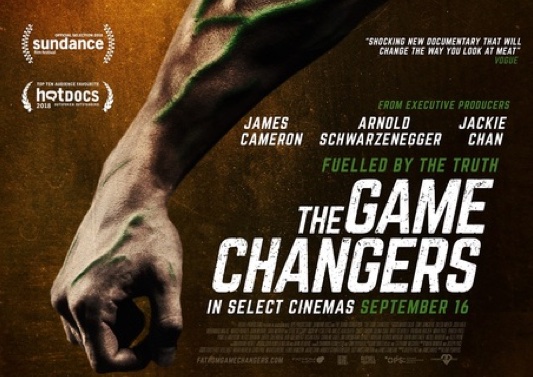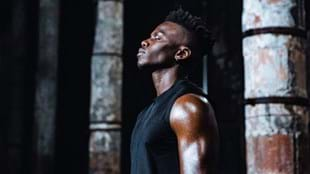Read on and you’ll discover:
• The high-profile celebrity vegans advocating plant-based diets
• The compelling history of plant-based diets — back when Roman gladiators were called 'barley eaters'
• How plant-based diets can supply sufficient nutrients for high-level sport performance
• The pros and cons of this new documentary — and lessons for active people
When two people asked me about this film in the space of two days – one of them a gym trainer – I knew it was time to head to Netflix to watch for myself.
The film is the work of vegan heavyweights. Executive produced by famous vegan James ‘Avatar’ Cameron (who also owns a plant-based protein company, Verdient Foods) alongside a long list of other Big Vegan Names including Arnold Schwarzenegger (who knew?!), actor Jackie Chan, Formula 1 champion Lewis Hamilton and tennis star Novak Djokovic. It’s a slickly-produced challenge to the outdated idea that ‘real men eat meat’.

The narrator and presenter is James Wilks, a former champion UFC fighter and now combat trainer of elite military personnel. Looking to recover from an injury, Wilks discovers a news-to-him secret: eating plants is good for performance. Much is made of a study which found that Roman gladiators consumed a diet that was mostly vegetarian; this was determined by measuring levels of different elements in excavated bones. Gladiators were even known as ‘barley eaters’. How could these famously strong, tough guys fight to the death eating only plants?, Wilks asks.
The question I asked myself was: were the gladiators eating differently from the rest of the population at the time? Were they doing that for performance reasons? Turns out, not really. No-one ate much meat back then; meat was relatively scarce in ancient Rome for ordinary people. Science Daily reports there was virtually no difference in terms of nutrition between gladiators and the local normal population, whose meals were mainly meat-free and grain-based. The term ‘barley eater’ probably relates to the fact that gladiators were likely given grain of an inferior quality (gladiators being mainly slaves, don’t forget).
None of that is said in the film, however, and it seems clear Wilks’ mind is blown. He’s shown reading medical textbooks while on the stationary bike. He then journeys around the world meeting high-performance athletes, all of whom say the switch to a vegan diet (though they don’t use that term – it’s ‘plant-based’ throughout) was the magical thing that flipped the switch for them, improved performance out of sight and unlocked gold medals and world records.
Wilks also interviews various doctors and experts, getting a basic ‘vegan 101’ along the way. Yes, we’re told, you can get all the protein you need from a plant-based diet. This is not surprising (it’s a well-established fact that vegan or vegetarian diets can be very healthy and nutritionally complete) except perhaps to some of the athletes in the film, several of whom speak of how they thought they had to eat a lot of meat to get big and strong, and one who even confesses to not knowing what most vegetables were before going vegan.
I like the message that plant-based diets can supply all the protein and other nutrients we need, even if we’re performing at the highest levels of sport.
The film doesn’t stop at emphasizing the benefits of plants. It also makes a point of detailing the harms of meat.
There’s a bit of pop science to hammer this point home. Experiments on athletes demonstrate that even a single meat-based meal is apparently enough to clog your blood with inflammatory compounds and impair sexual performance.
It’s a compelling narrative. By the end, if you’ve been wondering about changing your diet, you’ll be ready to make the switch. The world’s strongest man is vegan, weightlifters and bodybuilders and long-distance runners are vegan. A US football team changes its diet and makes the playoffs for the very first time. And a hard-man ranger, tasked with protecting rare rhino and elephants from gun-toting poachers, switches to a vegan diet after realizing he can’t eat animals in good conscience when his job is to save them.
So what are we to take from this? I think there are a few pros and cons from the film, and lessons for active people.
PRO: It busts the ‘meat is manly’ myth.
I like the message that plant-based diets can supply all the protein and other nutrients we need, even if we’re performing at the highest levels of sport. And it will speak to men, I think, to see big, strong guys achieving feats of athleticism and strength on the power of plants. If it encourages more men to eat more plants, that is a good thing.
CON: It’s all about the men.
As you may be able to tell, this is a very male-focussed film. There are a couple of female athletes featured – both are Olympians and both highly impressive, although a little unrelatable for the average woman. It’s unfortunate that this reinforces a message that this way of eating is for the elite, not the everyday person.
PRO: It shows plants are healthy and delicious.
The overriding message here is plant-positive: plants are anti-oxidant, anti-inflammatory and full of good things. Despite a weird side-track where the filmmakers try to conjure a conspiracy by equating meat-eating with smoking, no-one is going to disagree with that. As Dr David Katz points out in a brief interview, there is wide consensus that the healthiest ways of eating are plant-predominant.
CON: It encourages the argument ‘meat versus plants’.
It’s a shame the message is framed this way. It’s overly simplistic, unrealistic and not helpful for most people. It’s a story told with a firm agenda. There’s no allowance for the fact that no-one eats just meat; or that there are other ways of eating – which are legitimately plant-based – that contain animal foods and are also extremely healthy.
PRO: It shows very healthy people who eat plant-based diets.
The featured athletes are role models; who doesn’t want to be super-strong and fit in their 60s, for example, like Wilks’ gym trainer?
CON: There’s no context.
The film doesn’t mention all the other elements that go into making an amazing athlete: training, genetics, coaching, money, time, sleep, psychology. It also fails to mention any of the risks of adopting a vegan diet. For female athletes in particular this can include issues with inadequate intakes of absorbable iron and calcium, which if they lead to deficiencies, can be really serious. Anyone on a vegan diet needs to work harder, too, to get enough omega-3 and vitamin B12.
PRO: It brings plant-based eating to the masses.
It’s great if we can all talk more about eating in a plant-based way.
CON: Plant-based doesn’t have to mean plant-only.
I know many vegans like the term plant-based, and of course a vegan diet is plant-based. But let’s not forget that other healthful ways of eating – ways that might include a little animal food – can, and should, be described that way. Plant-based eating is for everyone, vegan or not.
You can find out more about The Game Changers here.
Niki Bezzant is a New Zealand-based food writer, editor and commentator. She is the founding editor (now editor-at-large) of Healthy Food Guide magazine, and is currently president of Food Writers New Zealand and a proud ambassador for the Garden to Table program which helps children learn how to grow, cook and share food. She is a member of the Council of Directors for the True Health Initiative, a global coalition of health professionals dedicated to sharing a science-based message of what we know for sure about lifestyle and health.








